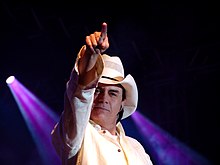Música Sertaneja

Música sertaneja [ ˈmuzikɐ seʁtaˈneʒɐ ] is originally a Brazilian style of music . The Música sertaneja has its roots in the rural, dry interior of the states of São Paulo , Goiás , Mato Grosso , Minas Gerais and Paraná , the eponymous Sertão .
Since the rural exodus from this particularly poor region to the urban agglomerations, especially to São Paulo , is particularly great , their music also migrated with the residents of the Sertão, the Sertanejos , and today can be considered a national style of music as well as the regional style São Paulo Paulos. For a short time the Música sertaneja was already a fashion music in the 1930s. In the 1980s and 1990s, the Brazilian mass media built the duos such as Leandro e Leonardo or Chitãozinho e Xororó, formerly reviled as duplas caipiras ("backwoodsmen couples"), into national stars, following the example of country musicians in the USA. Since then, posters of the singers in cowboy hats and designer cowboy clothing have been seen in many places, and some of these duos have even given very successful concerts in the USA.
Today's Música sertaneja has almost nothing to do with traditional folklore, what today operates under this name is basically pop music with two singers. Characteristic is the pair of singers who used to accompany themselves with a ten-string guitar ( viola ). Today the music is orchestrated with synthesizers , drums , electric guitar and electric bass . Stylistically, rural music styles such as toada , moda de viola , cana-verde and catira are mixed with influences from Bolivian, Mexican, Paraguayan and North American country music in the Música sertaneja . The lyrics of the songs are " Schnulzen about love and life in the country".
literature
- Alexander Sebastian Dent: River of tears. country music, memory, and modernity in Brazil , Duke University Press, 2009.
Individual evidence
- ↑ a b c d Chris McGowan, Ricardo Pessanha: The Brazilian Sound. Samba, Bossa Nova and the sounds of Brazil , Hannibal, St. Andrä-Wierter 1991, p. 240.
- ↑ Alexander Sebastian Dent: River of tears. country music, memory, and modernity in Brazil , Duke University Press, 2009, p. 117.
- ↑ Alexander Sebastian Dent: River of tears. country music, memory, and modernity in Brazil , Duke University Press, 2009, p. 120.